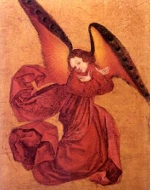Folk Religion vs. Christianity Part 2
© 11.22.11 By David Eric Williams
 In last week's article I mentioned something called folk religion. A good definition of American folk religion is provided by Robert Olson, professor of theology at George W. Truett Theological Seminary of Baylor University, who says "folk religion is unreflective religious belief based largely, if not exclusively, on feelings (e.g., comfort), traditional folk ways (e.g., funeral practices), cliches (e.g., bumper sticker slogans) and devotional literature (including poems, songs, religion fiction, etc.). It thrives on urban myths ('evangelegends') and unverifiable stories passed around among the faithful. It is unreflective and even resists reflection (especially critical reflection).
In last week's article I mentioned something called folk religion. A good definition of American folk religion is provided by Robert Olson, professor of theology at George W. Truett Theological Seminary of Baylor University, who says "folk religion is unreflective religious belief based largely, if not exclusively, on feelings (e.g., comfort), traditional folk ways (e.g., funeral practices), cliches (e.g., bumper sticker slogans) and devotional literature (including poems, songs, religion fiction, etc.). It thrives on urban myths ('evangelegends') and unverifiable stories passed around among the faithful. It is unreflective and even resists reflection (especially critical reflection).
I have recently experienced the ire of certain folk religion devotees in response to a booklet I wrote providing a Bible-based critical review of Todd Burpo's narrative, Heaven Is for Real. As you may know Mr. Burpo's book details the supposed visit of his son to heaven. It is amazing that a Christian publisher was found for the book in light of its numerous doctrinal errors. But then, I suppose Thomas Nelson Inc. knows a moneymaker when they see it and theological accuracy was a secondary consideration. For instance, Heaven Is for Real promotes the demonic practice of necromancy (communication with the dead).
The Bible says, there must never be found among you anyone who sacrifices his son or daughter in fire, practices divination, interprets omens, practices sorcery, casts spells, or who is a medium, an occultist, or a necromancer (Deuteronomy 18:10-11). Contrary to the followers of folk religion, this prohibition against spiritism has not been abrogated by the New Testament. Yet, a willingness to entertain familiar spirits in the guise of departed loved ones has a long history among practitioners of American folk religion. "Spiritualism" was pervasive in American life during the latter part of the 19th century and many churches adopted spiritism as a part of their religious experience. We see the same thing today in the torrent of "Christian books" telling stories of near death experiences, visits to heaven and the inevitable interview with dead loved ones and famous personalities from the Bible and church history.
As a result, the man in the pew is encouraged to cultivate devilish pursuits. For instance, one fan of the genera assured me that visiting with dead loved ones in heaven is acceptable – this based upon their own experience with necromancy. Apparently they had instructed a loved one on the point of death to send a message from the other side to reassure them of their arrival in heaven. Sure enough, the earthbound folk religionist received table knocking proof that their dearly departed was in a "better place."
We need to be very clear on this issue; no matter how prettily the picture is painted, necromancy is of the devil. It doesn't matter if we dress spiritism in Christian jargon, place it in a heavenly setting or relate the experience in childlike terms, it remains a prohibited practice. It is satanic and has no place in the life of a follower of Jesus Christ.
Christians must not base their religious views upon feelings and superstition but upon the written word of God. We must critique all things in a Berean like fashion and carefully examine the Scriptures to see if [these] things [are] so (Acts 17:11). The many Christians who have read and enjoyed books like Heaven Is For Real need to recognize their doctrinal ignorance and make an effort to correct the problem. They need to study God's word in depth on a daily basis and insist on solid Bible teaching from the pulpit. Until then American folk religion will continue to spread its malignant influence throughout the Body of Christ.
Entire Site Copyright © 2025 By David Eric Williams










